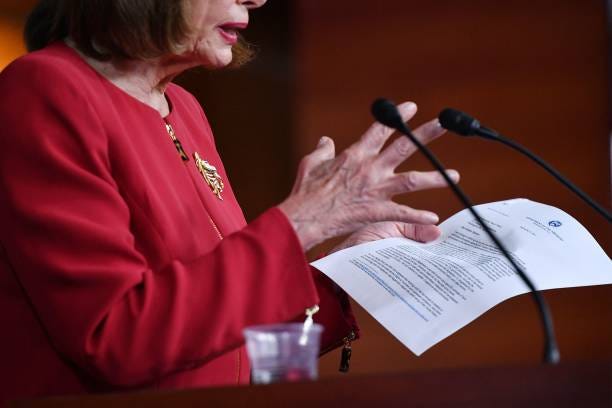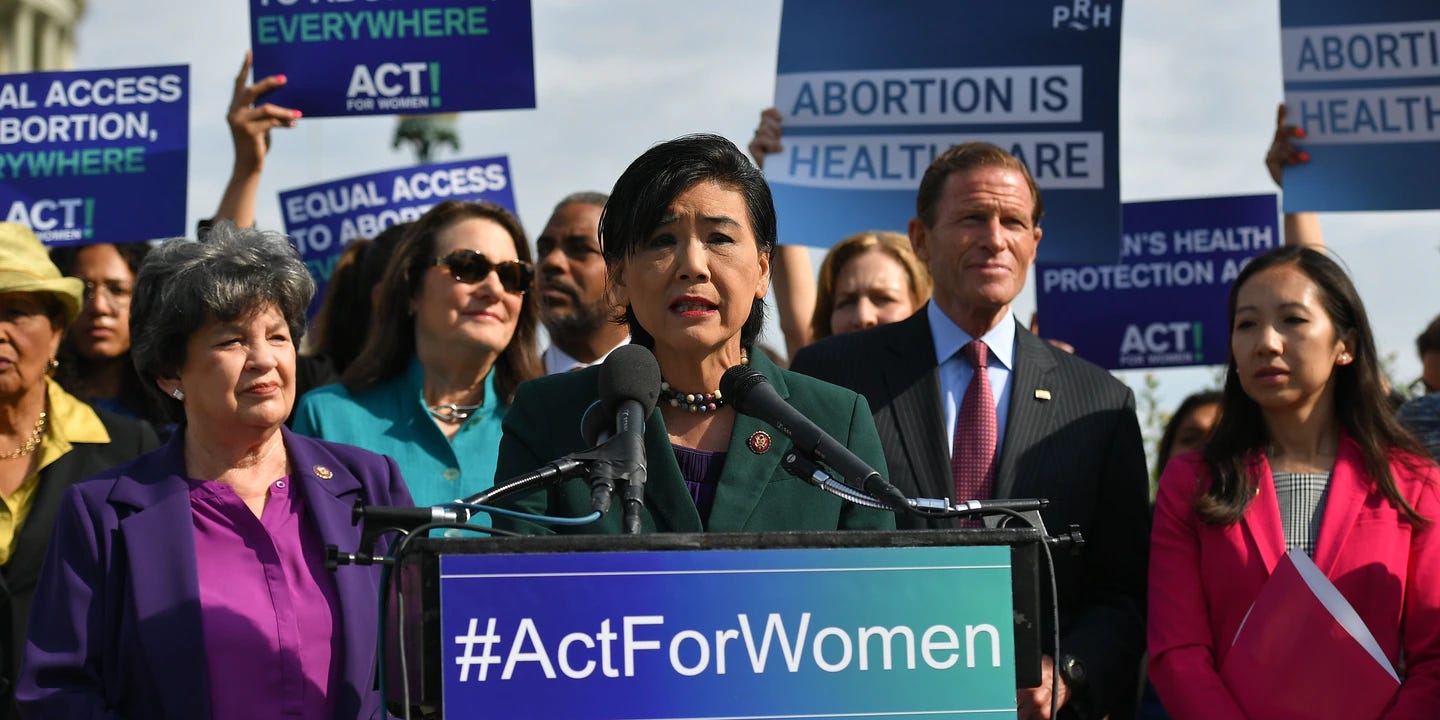Democrats Look to Hasten Reforms
As Congress returns from the shortened summer break, many pressing issues have created the urgent need for all Democrats to hit the ground running this week.
Your paid subscriptions to SHERO allow me to continue publishing on this critical issue and provide information to the public, so please consider purchasing one today. If you would like to make a one-time tribute via PayPal, you can click this link now for that option. As always, thank you for taking the time to read and support my work here at SHERO and for helping to provide independent journalism for everyone.
I appreciate you.

Democrats in Congress are facing a serious time crunch this week, even though members are not technically scheduled to return for floor votes until Sept. 20. The ongoing negotiations between progressive and moderate Democrats over how exactly to include portions of Biden’s “Build Back Better” safety net provisions has also created a bit of a crunch on the time front.
The recent passage of Texas’ extreme law on abortion and the impending debt ceiling issue have also added another layer of priorities to a list that is already marked “urgent.” The issue appears to be one of timing, with Democrats fielding resistance within their own party on top of traditional Republican kickback. Below is a breakdown of the major legislative issues facing the country at this point, and how Speaker Pelosi and the Biden administration are preparing to tackle them.
The Debt Ceiling

Congress is preparing for a monumental battle over the issue of the debt ceiling as the Treasury Department confirms that the U.S. government will run out of money to pay its bills by the end of this month.
In a letter to congressional leaders Wednesday, Treasury Secretary Janet Yellen warned of the impending deadline saying. "The most likely outcome is that cash and extraordinary measures will be exhausted during the month of October." Yellen also emphasized that "waiting until the last minute" to tackle the issue could "cause serious harm to business and consumer confidence."
While lawmakers on both sides of the aisle know that failing to raise the debt limit would be catastrophic for the economy, Republicans are still hard at work trying to leverage a holdout in exchange for concessions and benefits. The result will likely yield a stop-gap short-term funding bill, known as a continuing resolution (CR), which would serve to keep federal agencies open past the end of the fiscal year.
The CR will likely extend funding until sometime in early December, with no real end date finalized yet, according to sources. The White House is also looking to add more than $20 billion in emergency funding to the resolution to address disaster relief from this month, and to cover resettlement costs for tens of thousands of Afghan refugees.
Speaker Pelosi said Wednesday that Democrats won’t include a debt limit increase in the reconciliation package, after Republicans vowed not to vote for an increase of the debt limit, instead urging Democrats to pass it through the reconciliation maneuver.
Pelosi said the $28.5 trillion debt limit must be raised, but would not say whether this would be included in a must-pass bill to keep the government running, expected at the end of September. "I am not here to talk about where" the debt limit would be raised, "but it won't be in reconciliation," she told reporters.
Democrats are currently crafting the reconciliation package, a sweeping social spending bill, and hope to pass it in the coming weeks, despite threats from the GOP to block it. Senate Minority Leader Mitch McConnell has confirmed that he won’t allow Democrats to move forward with their massive reconciliation package without significant pushback, so expect an ongoing back and forth in the weeks to come.
Abortion
President Biden last week pledged a “whole-of-government effort” to respond to the Supreme Court’s order allowing the Texas law to stand, and said he asked the Justice Department to explore ways to challenge it. In a statement issued last week, President Biden said, “The Supreme Court’s ruling overnight is an unprecedented assault on a woman’s constitutional rights under Roe v. Wade, which has been the law of the land for almost fifty years.”

The Department of Justice is planning to sue Texas as soon as this week, and the formal suit could come as early as today. Attorney General Merrick Garland has already confirmed that the DOJ is exploring options to challenge the law, but the Biden administration faces increasing public pressure this week to act.
While it is still possible the DOJ’s timeline for filing will be pushed back, the Justice Department is expected to pursue an argument that the Texas law illegally interferes with federal interests. The exact details of those purported arguments are not yet available at this point, and whether any appellate court will agree to hear the case remains the largest question to be answered.
House Speaker Nancy Pelosi (D-CA) has also announced that the House of Representatives will vote on an abortion rights bill once Congress is convened on Sept. 20, on that first week members are back. “Upon our return, the House will bring up Congresswoman Judy Chu’s Women’s Health Protection Act to enshrine into law reproductive health care for all women across America," Pelosi said.

The legislation proposed by Chu would establish a legal right to abortion nationwide, while barring “medically unnecessary restrictions'' on women who chose to have an abortion. The bill currently has more than 200 Democratic co-sponsors, and should pass the House, but is expected to face substantial conservative opposition in the Senate.
The Supreme Court’s refusal to hear the Texas case has created the most pivotal moment in the long struggle over abortion since the Roe v. Wade case was decided in 1973. Speaker Pelosi has called these actions by Supreme Court “cowardly,” and has referred to the decision as a “dark-of-night” scheme meant to “uphold a flagrantly unconstitutional assault on women’s rights and health [that] is staggering.”
The ramifications of this latest decision by the Court don’t end with Texas. The Supreme Court has already agreed to take up a key abortion case this fall concerning a controversial Mississippi law that banned most abortions after 15 weeks. Abortion rights are now being attacked from the front and from the side, as the issue of abortion rights is quickly becoming a central issue heading into the Midterm Election next fall.
Safety Net Programs

The House Ways and Means Committee released hundreds of pages of legislative text on Tuesday, and announced scheduled hearings for Thursday and Friday. The bill would provide substantial increases to America’s Safety Net programs, including increased paid family and medical leave for all workers; expanded Medicare benefits; and new investments to bolster nursing homes and long-term care, among other provisions.
Democrats have been embroiled in ongoing negations, with the White House often rushing in at times to resolve disagreements, two NBC News sources familiar with the emerging bill said. The crux of the issue involves progressive Democratic lawmakers, who are demanding multi-trillion dollar social safety net increases as a concession from moderates, or else they say they will vote down the Senate-passed infrastructure bill.
Moderate Senate Democrats have countered by saying they won't vote to begin writing the $3.5 trillion bill until the House passes the infrastructure legislation the Senate just passed. The issue at hand appears to be one of timing, versus the majority of actual proposed funding. Considering that Democrats hold such narrow majorities in both the Senate and the House, there are really no votes to spare in an ongoing squabble.

A memo to congressional offices on Tuesday from White House communications director Kate Bedingfield seemed to have refocused the mission for Democrats on the hill. Bedingfield reminded Democrats that those who are said to be Republicans, who oppose Biden's "Build Back Better" agenda are fighting to protect the rich, emphasizing that we must level “the playing field to ensure the wealthiest and corporations pay their fair share and working families get a fighting chance to succeed and prosper in this country."
According to a Democratic Senior Aide, Democrats are now “at a place where the rubber is hitting the road in terms of shaping the policy and fine-tuning everything and really racing toward those deadlines.” The source also confirmed that the Senate hopes to vote on the bill by Sept. 27 and is hopeful about the outcome: "We're obviously setting an ambitious timeline, but we're moving forward to meet it."
Facing unanimous Republican opposition and narrow majorities, Democrats have very little wiggle room in terms of votes in both the House and Senate. The goal: develop legislation that can pass both chambers without having to go back and forth, to shore up time constraints, include critical progressive safety net demands, and satisfy the timing for centrist lawmakers who continue to drag their heels.
Bipartisan Infrastructure
Speaker Pelosi has agreed to hold a floor vote on the bipartisan $1 trillion infrastructure bill by Sept. 27. Democrats will simultaneously continue to “negotiate” with each other and the White House over the reconciliation package that involves spending and taxes for Medicare, Medicaid and Obamacare.

Pelosi and House Democratic leaders are pushing to get the reconciliation package through the Budget Committee by that date after making concessions to holdouts like Manchin (D-WV) and Sinema (D-AZ) on lowering the price tag overall. Progressive Democrats are likely questioning whether they will trust their party members to vote for the bipartisan infrastructure bill if the reconciliation package isn’t yet ready.
In order to make sure Democratic moderates don’t get their preferred version of an infrastructure bill passed, and then turn around and vote against reconciliation, the timing could be tricky, and turn into a massive trust exercise. It also seems likely that the most reasonable solution will be Pelosi pushing back the Sept. 27 floor vote date if the ongoing scuffle has not been settled.
Amee Vanderpool writes the SHERO Newsletter and is an attorney, published author, contributor to newspapers and magazines, and analyst for BBC radio. She can be reached at avanderpool@gmail.com or follow her on Twitter @girlsreallyrule.
Paid subscriptions and one-time tributes embedded in each article allow me to keep publishing critical and informative work that is sometimes made available to the public. If you like this piece and want to support independent journalism further, you can forward this article to others, get a paid subscription or gift subscription, or donate once, as much as you like today.



